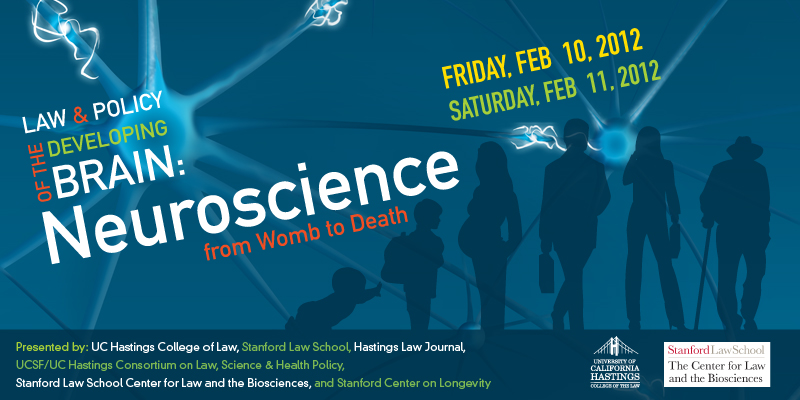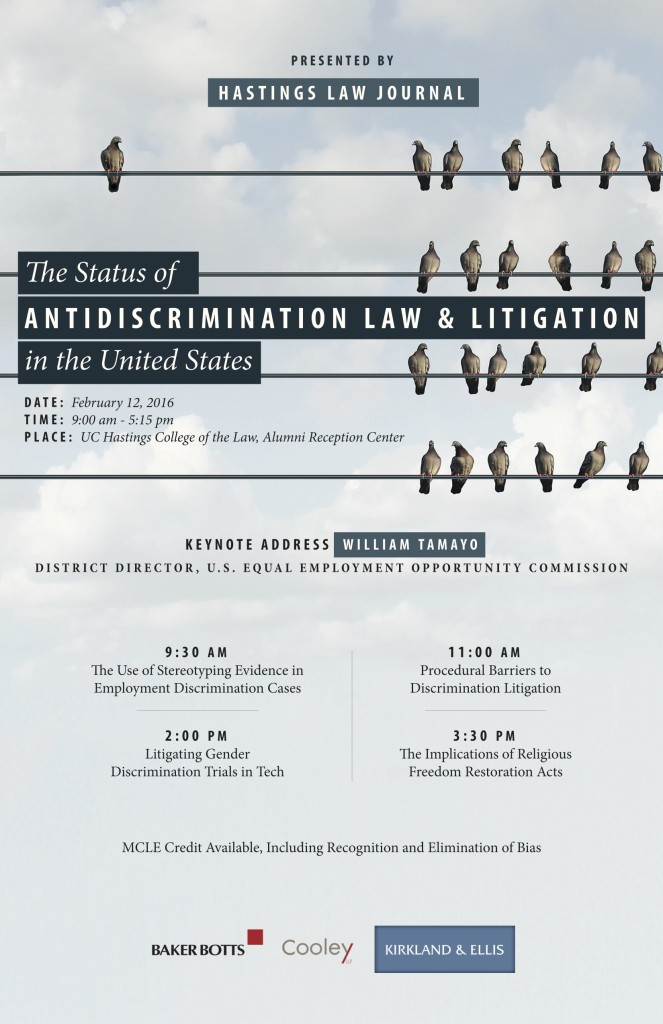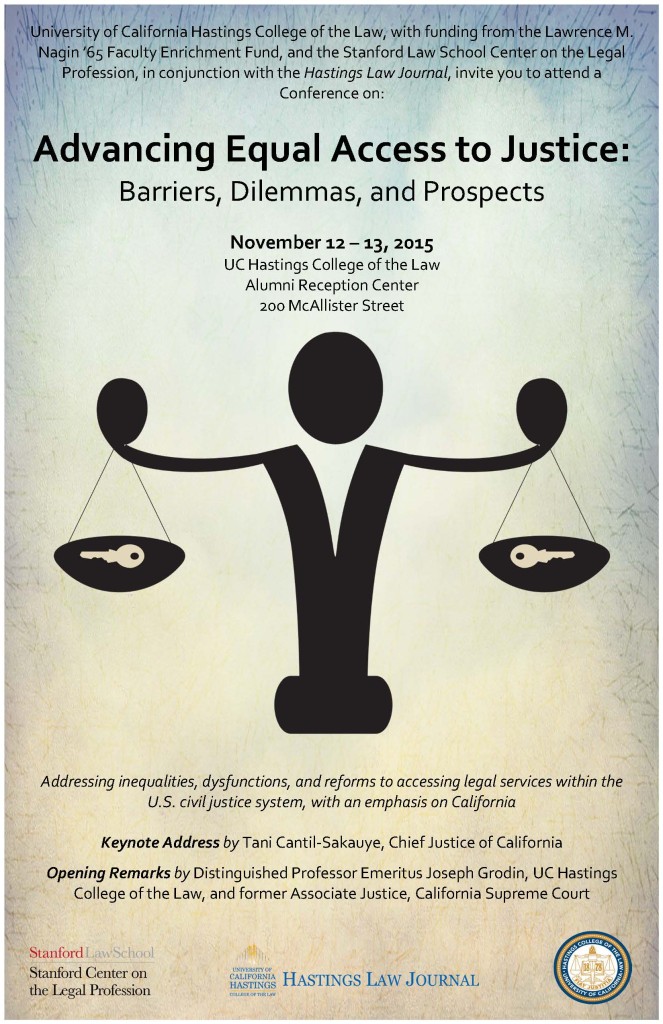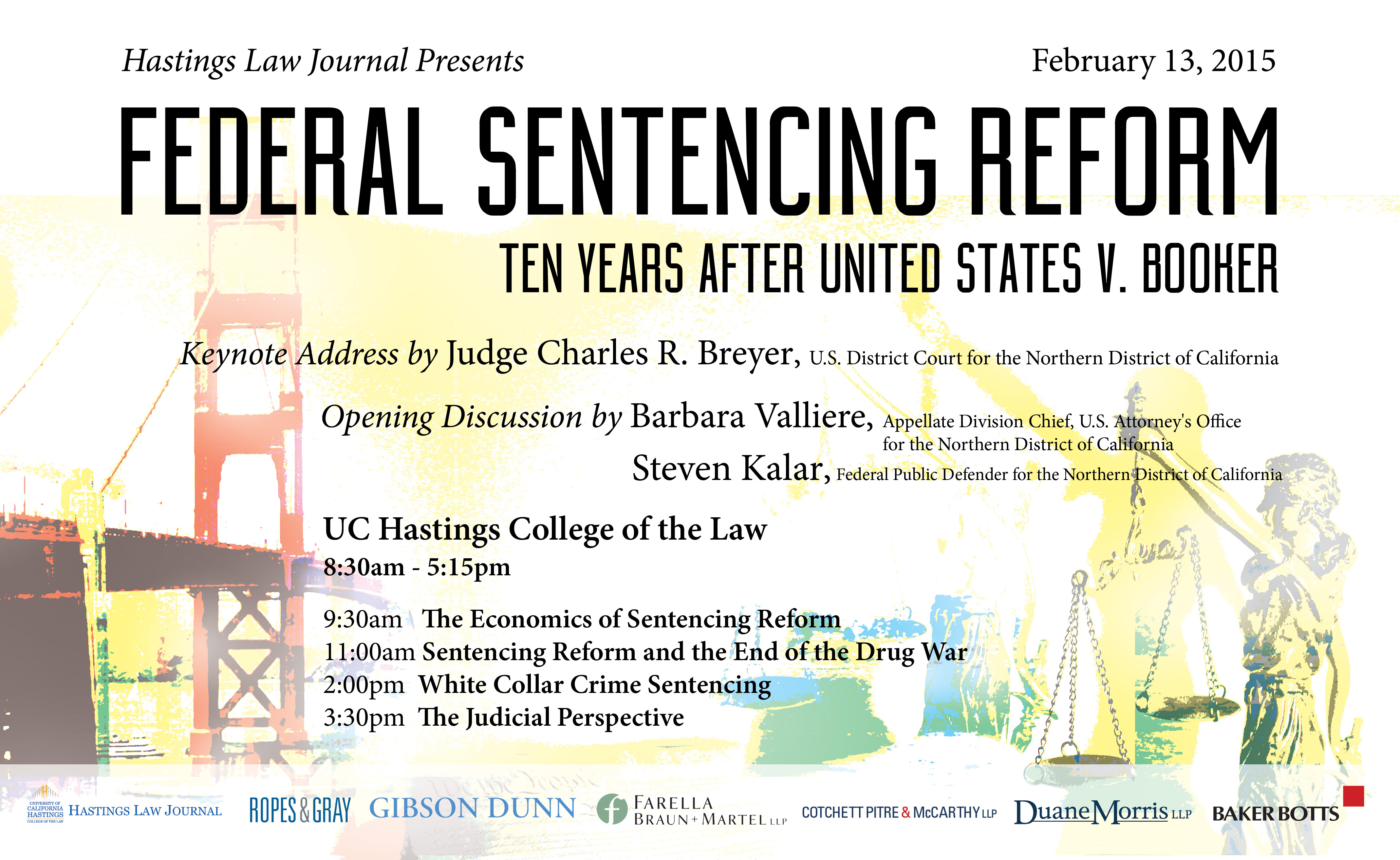Past Symposia
Spring Symposium: February 2019
“The Jurisprudence of Justice Anthony M. Kennedy: Four Decades of Influence”
For biographies on speakers, schedules, and more information, please view the program here.
On Friday February 1, 2019, U.C. Hastings and its flagship law journal sponsored an all-day symposium on its campus in San Francisco on the Jurisprudence of Justice Kennedy. The symposium featured a conversation with Justice Kennedy and several of his former law clerks. Please view the agenda, here.
Orin Kerr on “Justice Kennedy and the Counter-Majoritarian Difficulty”:
Justice Kennedy and Due Process:
Justice Kennedy’s Overall Impact, Panelists: The Honorable Marsha Berzon, Judge, U.S. Court of Appeals for the 9th Circuit; Professor Dan Epps, Washington University Law School (Kennedy clerk OT ‘09); Professor Zachary Price, U.C. Hastings College of the Law (Kennedy clerk OT ‘05); Professor Rory Little.
The symposium included papers and presentations addressing:
— Justice Kennedy’s impact on First Amendment doctrine and issues.
— Due Process rights, including LGBT rights and same-sex discrimination.
— The overall impact of Justice Kennedy’s judicial work on the U.S. Supreme Court as well as the U.S. Court of Appeals for the Ninth Circuit and on American law generally.
Confirmed participants included:
— Justice Anthony M. Kennedy, United States Supreme Court.
— The Honorable Marsha Berzon, Judge, U.S. Court of Appeals for the 9th Circuit.
— The Honorable Gary Feinerman, U.S. District Court, Northern District of Illinois (Kennedy clerk OT ’93).
— Dean Erwin Chemerinsky, U.C. Berkeley Law School.
— Miles Ehrlich (Kennedy clerk OT ’93).
— Professor Orin Kerr, USC Gould School of Law (Kennedy clerk OT ’03).
— Professor Nadine Strossen, New York Law School.
— Professor Melissa Murray (Sotomayor clerk 2003-04).
— Professor Dan Epps, Washington University Law School (Kennedy clerk OT ‘09).
— Professor Leah Litman, U.C. Irvine Law School (Kennedy clerk OT ‘11).
— Professor Ashutosh Bhagwat, U.C. Davis Law School (Kennedy clerk OT ‘91).
— Professor Zachary Price, U.C. Hastings College of the Law (Kennedy clerk OT ‘05).
— Professor Matt Coles, U.C. Hastings College of the Law.
— Professor Russell Robinson, U.C. Berkeley School of Law.
Spring Symposium: February 2018

Spring Symposium: March 2017
Legal Issues Surrounding Encryption and Decryption
Hastings Law Journal cordially invites all students, faculty, practitioners, and members of the legal community to our annual Spring Symposium. This year’s symposium will focus on the legal issues that surround encryption and decryption.

Spring Symposium: February 2016
The Status of Antidiscrimination Law and Litigation in the United States
Fall Symposium: November 2015
Advancing Equal Access to Justice: Barriers, Dilemmas, and Prospects
Spring Symposium: February 2015
Federal Sentencing Reform
Fall Symposium: September 2014
Forum Selection After Atlantic Marine
Video from the Atlantic Marine Symposium
In Atlantic Marine Construction Co. v. United States District Court, the U.S. Supreme Court clarified the legal effect and implications of private restrictive forum‐selection clauses (agreements to litigate only in a particular forum). The Court’s opinion makes several changes to venue doctrine. First, the Court held that private forum‐selection clauses do not make an otherwise proper venue improper. Thus, the clauses cannot be enforced under 28 U.S.C. § 1406(a) or via a motion to dismiss for improper venue under Federal Rule of Civil Procedure 12(b)(3). Second, the Court held that restrictive forum‐selection clauses may be enforced through a venue transfer under 28 U.S.C. § 1404(a). When a restrictive forum‐selection clause is at issue, however, courts should presumptively transfer to the party‐selected venue under § 1404(a) unless public factors strongly resist transfer. Third, the Court held that, unlike normal § 1404(a) transfers in which the transferee court applies the law that the transferor court would have applied under the doctrine established in Erie Railroad Co. v. Tompkins, a transferee court receiving a § 1404(a) transfer based on a restrictive forum‐selection clause should apply its own law. Atlantic Marine thus affects the law of venue, the law of venue transfer, the Erie Doctrine, and the ability of parties to contractually control their litigation. This symposium will consider the effects and implications of Atlantic Marine on the law of venue, Erie, and beyond. Scholarship associated with the symposium will be published in the April 2015 issue of Hastings Law Journal.
In order to ensure that your MCLE credit is recorded, please remember to sign in and out, with your Bar Association number and email address, at the welcome desk.
Click here for more information
Spring Symposium: February 2014
Hastings Law Journal held its Spring 2014, The Legal Dimension of 3D Printing, on Friday, February 21, 2014 at the Hastings Alumni Reception Center. The symposium focused on the array of legal issues, new and old, posed by the wide-availability of 3D printing technology. For example, how will regulatory bodies address printable organs, medical devices, and printable aircraft? What are the implications for patent and copyright law?

Spring Symposium: February 2013
The Hastings Law Journal Spring 2013 symposium, From Bench to Society: Law and Ethics at the Frontier of Genomic Technology, was held on Friday, February 8, 2013, on the campus of the University of California – Hastings College of the Law. The symposium was co-sponsored with the UCSF – UC Hastings Consortium.
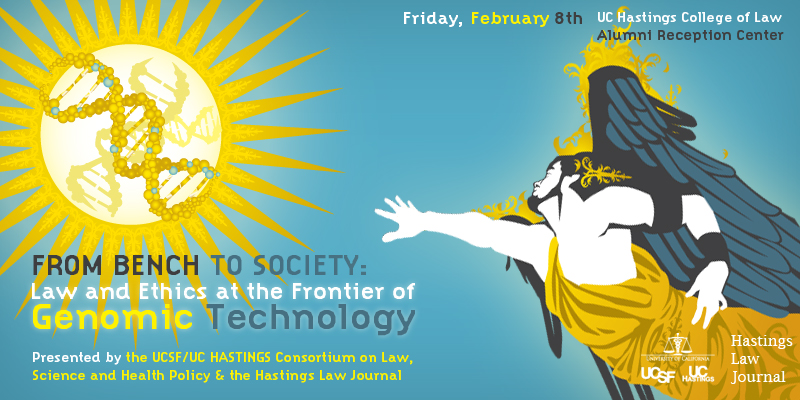
Spring Symposium: February 2012
The Hastings Law Journal‘s Spring 2012 Symposium tackled the shifting policy implications of new developments in neuroscience.
The symposium, cosponsored with Stanford University, took place over two days: February 10, 2012, at UC Hastings and Februrary 11, 2012, at Stanford University. A series of panels considered the legal and policy implications of new developments in neuroscience technology. The event unfolded along developmental lines, with the first panel discussing possible regulations over prenatal neurological development, continuing through discussions about custody and separation effects on childhood neurological development, and ending the first day considering adolescent brain development and possible changes to criminal law. The second day at Stanford featured panels regarding onset of dementia and determining mental competency and end-of-life decisions.
We had a great keynote speaker, Robert Sapolsky, a MacArthur Fellow, and we featured many more interesting neuroscience and legal thinkers. For those of you who could not attend, we have video of this highly topical, fascinating inquiry into where brain technology is leading our laws and our policies.
